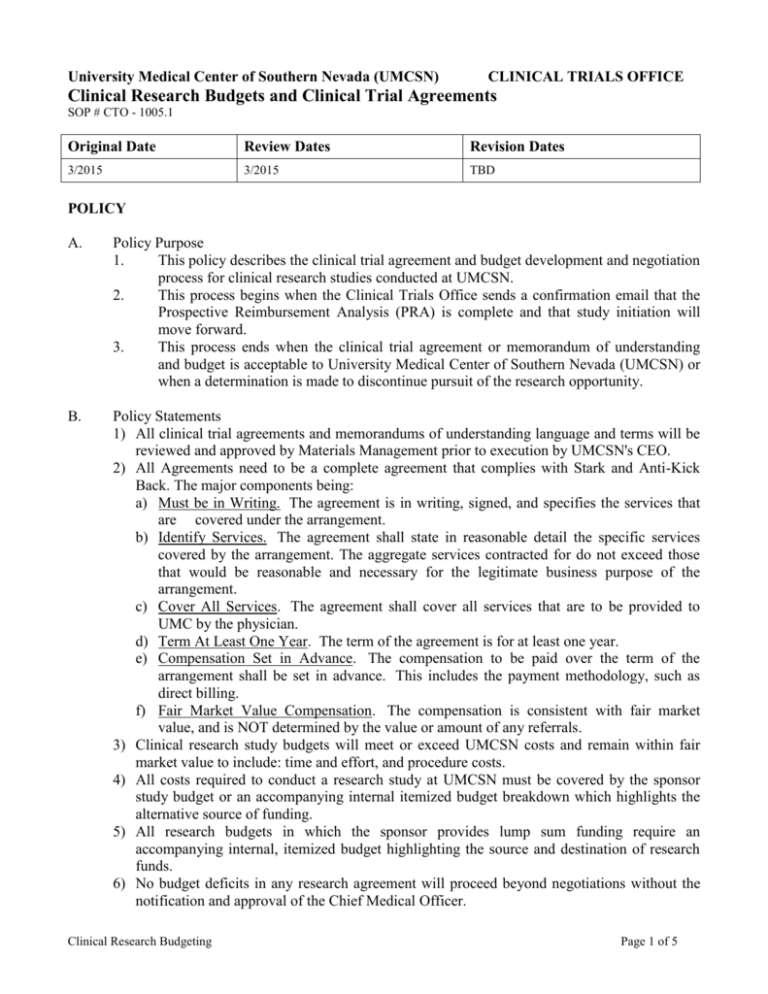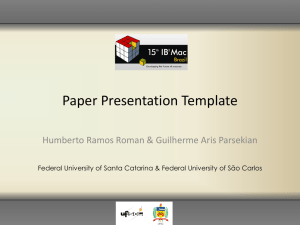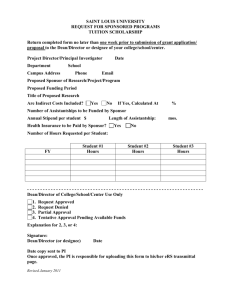Clinical Trials Office
advertisement

University Medical Center of Southern Nevada (UMCSN) CLINICAL TRIALS OFFICE Clinical Research Budgets and Clinical Trial Agreements SOP # CTO - 1005.1 Original Date Review Dates Revision Dates 3/2015 3/2015 TBD POLICY A. Policy Purpose 1. This policy describes the clinical trial agreement and budget development and negotiation process for clinical research studies conducted at UMCSN. 2. This process begins when the Clinical Trials Office sends a confirmation email that the Prospective Reimbursement Analysis (PRA) is complete and that study initiation will move forward. 3. This process ends when the clinical trial agreement or memorandum of understanding and budget is acceptable to University Medical Center of Southern Nevada (UMCSN) or when a determination is made to discontinue pursuit of the research opportunity. B. Policy Statements 1) All clinical trial agreements and memorandums of understanding language and terms will be reviewed and approved by Materials Management prior to execution by UMCSN's CEO. 2) All Agreements need to be a complete agreement that complies with Stark and Anti-Kick Back. The major components being: a) Must be in Writing. The agreement is in writing, signed, and specifies the services that are covered under the arrangement. b) Identify Services. The agreement shall state in reasonable detail the specific services covered by the arrangement. The aggregate services contracted for do not exceed those that would be reasonable and necessary for the legitimate business purpose of the arrangement. c) Cover All Services. The agreement shall cover all services that are to be provided to UMC by the physician. d) Term At Least One Year. The term of the agreement is for at least one year. e) Compensation Set in Advance. The compensation to be paid over the term of the arrangement shall be set in advance. This includes the payment methodology, such as direct billing. f) Fair Market Value Compensation. The compensation is consistent with fair market value, and is NOT determined by the value or amount of any referrals. 3) Clinical research study budgets will meet or exceed UMCSN costs and remain within fair market value to include: time and effort, and procedure costs. 4) All costs required to conduct a research study at UMCSN must be covered by the sponsor study budget or an accompanying internal itemized budget breakdown which highlights the alternative source of funding. 5) All research budgets in which the sponsor provides lump sum funding require an accompanying internal, itemized budget highlighting the source and destination of research funds. 6) No budget deficits in any research agreement will proceed beyond negotiations without the notification and approval of the Chief Medical Officer. Clinical Research Budgeting Page 1 of 5 DEFINITIONS UMCSN Staff Physicians: Physician that is an employee/staff of UMCSN that can conduct research under a clinical trial agreement (CTA) between the sponsor and UMC and does not require any further agreements. This is applicable to research activities in which UMCSN is “Engaged” in the conduct of the research per Office for Human Research Protections (OHRP) “Guidance on Engagement of Institutions in Human Subjects Research.” The Full Service Model requires UMCSN to be a party to the agreement along with the Investigator and Sponsor. This model also requires the following: A full PRA IRB review and approval by one of UMCSN’s IRBs of record A Budget developed by the Clinical Trials Office Contracted Priviledged Physicians: Applicable to research activities in which, a Physician is NOT an employee or agent of UMC and is contracted to perform services under a profession services agreement. An additional Memorandum Of Understanding (MOU) is required for each contracted privileged physician and or contracted group to conduct funded research/clinical trials at UMC. Each funded research/clinical trial protocol/budget will require an internal financial agreement (pro forma agreement) that (1) must be in writing, (2) identifies services, (3) covers all services, (4) term of at least one year, (5) compensation is set in advance, and (6) compensation is fair market value. The Contracted Priviledged Physician does not require UMCSN to be a party to the agreement along with the Investigator and Sponsor; however, a 2-party agreement (MOU) between the Investigator (and/or Investigators practice) and UMCSN is required. This also requires the following: A Prospective Reimbursement Analysis (PRA) focused on those items and services to be performed on a UMCSN campus Institutional Review Board (IRB) review and approval (but not necessarily from one of UMCSN’s IRBs of record) A Budget (also specific to those items and services to be performed on a UMCSN campus) to be developed by the Clinical Trials Office Non-Contracted Priviledged Physicians: Physicians that are privileged to practice at UMC but do NOT have a contractual relationship with UMC. A Memorandum Of Understanding (MOU) is required for each funded research/clinical trial protocol/budget conducted at UMC. This agreement (1) must be in writing, (2) identifies services, (3) covers all services, (4) term of at least one year, (5) compensation is set in advance, and (6) compensation is fair market value. PROCEDURE/GUIDELINE A. The Clinical Trials Office determines the physician type required for contract and budget review by reviewing the Clinical Trials Office Application and associated materials. 1. If the physician is identified as a UMC Staff Physician, follow steps in Procedure Section B. 2. If the physician is identified as a Contracted or Non-Contracted Priviledged Physician, follow steps in Procedure Section C. UMC Staff Physician B. The Clinical Trials Office completes the following steps for contract and budget development: 1. Obtains and reviews the material submitted by the PI with the application. Clinical Research Budgeting Page 2 of 5 2. 3. 4. 5. Completes a CAR form and routes to Materials Management with a copy of the draft Clinical Trials Agreement (CTA). Reviews the Prospective Reimbursement Analysis and incorporates items and services not covered by third-party payers into the Internal Budget Template. a. This review is sufficient enough to ensure that there is consistency between the PRA results and what the internal budget proposes to charge the third party payers/ Medicare. Completes the Internal Budget Template to populate study specific items and services as follows: a. Itemizes all procedures required in the protocol’s schedule of events with amounts that meet or exceed UMCSN costs. b. Includes all applicable initiation fees (including Prospective Reimbursement Analysis, Start-Up, Budget, Pharmacy, Institutional Review Board (IRB), Training, etc.). c. Gathers pricing information using the UMCSN Charge Description Master (CDM). d. Gathers input from impacted departments to gauge additional fees or financial needs required to conduct the research. e. Populates Internal Budget Template in accordance with Section B. 2. of the Policy Statements above. f. Adds administrative and regulatory costs to include: i. IRB ii. Administrative time and effort iii. Office supplies, copy fees and other general office costs g. Compares the resulting Internal Budget Template to the sponsor’s proposed budget to determine any existing budgetary shortfall. Negotiates budget with sponsor to address all budgetary shortfalls. a. If there is a budgetary shortfall between the sponsor’s proposed budget and the calculated costs in the Internal Budget Template, negotiate the budget to meet or exceed costs in accordance with Section B. 2. of the Policy Statements above. i. If a budgetary shortfall cannot be resolved with the sponsor or the Chief Medical Officer, cease sponsor negotiations and notify the PI via email that additional funding sources are required. b. If there are no budgetary shortfalls between the sponsor’s budget and the calculated study costs, or if the Chief Medical Officer has approved the budgetary shortfall, perform the following steps: i. Finalize the Internal Budget Template to match negotiated amounts. ii. Include the finalize sponsor budget template with negotiated amounts in the contract. iii. Notify the PI of the completion of the final budget via email. iv. Send a copy of the finalized budget to Materials Management for incorporation of the budget into the Clinical Trial Agreement. Contracted or Non-Contracted Priviledged Physicians C. The Clinical Trials Office completes the following steps for budget development: 1. Obtains and reviews the material submitted by the PI with the application: a. These materials differ from UMCSN Staff Physician submissions and represent the minimum set of information required to provide services to the study team at fair market value. Clinical Research Budgeting Page 3 of 5 2. 3. 6. b. Minimum set of information required is as follows: i. Clinical Trials Office Application which includes the desired items and services to be performed on a UMCSN campus ii. Full Protocol describing services to be performed on a UMCSN campus iii. PI proof that clinical trial agreement and budget will accurately represent what UMCSN will bill to Medicare in accordance with federal guidance. Reviews the limited Prospective Reimbursement Analysis and applies results into the Internal Budget Template. a. This review is sufficient enough to ensure that there is consistency between the PRA results and what the internal budget proposes to charge the third party payers/ Medicare. Completes the Internal Budget Template to populate study specific items and services as follows: a. All procedures required in the protocols schedule of events are itemized with amounts that meet or exceed UMCSN costs. b. Gathers research pricing information using the UMCSN Charge Description Master (CDM) Research Pricing List. c. Gathers input from impacted departments to gauge additional financial needs required to conduct the research. d. Populates Internal Budget Template in accordance with Section B. 2. of the Policy Statements above. e. Adds administrative and regulatory costs to include: i. Administrative time and effort ii. Office supplies, copy fees and other general office costs f. Compares the resulting Internal Budget Template to the sponsor’s proposed budget to determine any existing budgetary shortfall. Negotiates budget with PI or external group to address all budgetary shortfalls. a. If there is a budgetary shortfall between the proposed budget and the calculated costs in the Internal Budget Template, negotiate the budget to meet or exceed costs in accordance with Section B. 2. of the Policy Statements above. i. If a budgetary shortfall cannot be resolved with the PI or external group or the Chief Medical Officer, cease negotiations and notify the PI or external group via email that additional funding sources are required. b. If there are no budgetary shortfalls between the PI’s budget and the calculated study costs, or if the Chief Medical Officer has approved the budgetary shortfall, perform the following steps: i. Finalize the Internal Budget Template to match negotiated amounts. ii. Include the finalize budget with negotiated amounts in the Memorandum of Understanding Agreement (MOU). iii. Notify the PI of the completion of the final budget via email. iv. Create a CAR and route the MOU and budget to Materials Management for review, approval and execution - see Clinical Trials Agreements SOP# CTO1005.1. FOR MORE INFORMATION CONTACT Director, Clinical Trials Office APPROVAL BODIES Clinical Research Budgeting Page 4 of 5 Clinical Trials Office KEYWORDS Clinical Research, IRB Clinical Research Budgeting Page 5 of 5








